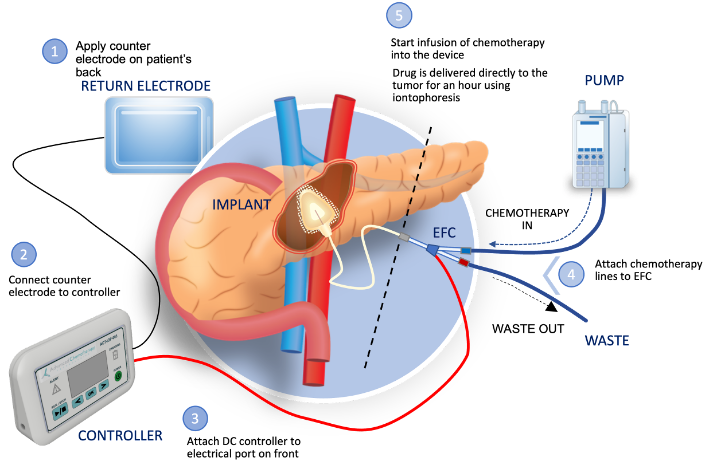Successful completion of development of a precision therapeutic system designed to safely achieve high concentration…

PRESS RELEASE: Notice of Allowance Received from U.S. Patent and Trademark Office for Patent Application with Claims Covering Combination Iontophoresis and Radiation Therapy
Raleigh, NC, August 30th, 2019 – Advanced Chemotherapy Technologies, Inc. (www.advancedchemotech.com), a combination drug-device company focused on developing iontophoresis drug delivery devices, today announced that the United States Patent and Trademark Office (USPTO) has issued a notice of allowance for ACT’s exclusively licensed patent application 14/978,262. The allowed patent application covers a method of delivering therapeutic agents to a target site of body
tissue using iontophoresis in combination with radiotherapy. This allowance is significant because it is not specific to which therapeutic is delivered, is not limited to a particular type of cancer and can be used in combination with a variety of radiosensitizers and radiation sources.
“The claims granted by the USPTO provide ACT with broad-based protection on the very valuable combination of iontophoresis and radiation therapy. We continue to fortify the patent portfolio around our technology, now adding radiotherapy to the iontophoresis technology that has already demonstrated unprecedented tumor responses,” said Tony Voiers President and CEO of ACT.
Every day, an estimated 150 Americans will be diagnosed with pancreatic cancer, and about 120 people will die from the disease. One of the major challenges of pancreatic cancer that contributes to its poor survival rates is the development of resistance to standard chemotherapy. Heterogeneity of the tumor, the dense fibroblastic stroma, and the aggressive biology of the tumor all contribute to chemoresistance. Furthermore, as the aggressive tumor grows into adjacent tissues, it can invade the liver or the stomach, and more often invades local vasculature, rendering the tumor inoperable. As surgical resection is currently the gold standard for treatment, a locally advanced tumor that is non-resectable leaves patients in a state where only palliative care may be offered. ACT is developing a technology that will convert patients with locally advanced non-resectable disease into candidates for surgical resection, by shrinking the tumor away from these vital structures, improving quality of life and extending survival.
Over the last 20 years, combining chemotherapy and radiation has changed cancer care. Chemotherapy agents can help sensitize radiation so that it works better, and potentially preventing or delaying metastasis. In many cases, the addition of chemotherapy to radiation actually leads to improvements in overall survival versus just using radiation alone.
The combination iontophoresis and radiation technology was developed at the UNC School of Medicine by collaborating scientists Joseph DeSimone, Ph.D., then M.D./Ph.D. student James Byrne and Joel Tepper, M.D. DeSimone is a chancellor’s eminent professor of chemistry at UNC and the William R. Kenan Jr. Distinguished Professor of Chemical Engineering at N.C. State University and of Chemistry at UNC. DeSimone is also co-founder and CEO of Carbon3D. Byrne is now a Clinical Fellow in Radiation Oncology at Massachusetts General Hospital. Tepper is the Hector MacLean Distinguished Professor in Cancer Research at UNC-Chapel Hill. ACT holds exclusive rights to the patented technology.
About ACT
ACT is a biotechnology company developing implantable devices to infuse chemotherapy drugs directly into affected organs, targeting difficult-to-reach tumors while largely sparing surrounding tissues, organs and blood vessels. Our first device, about the size of a quarter, will be implanted in the pancreas with electrical leads running to the abdomen. The device uses a process called iontophoresis that drives the chemotherapy into the tumor using electrical currents that pass through the drug solution into the tissue. The desmoplastic stroma that is a barrier to systemic chemotherapy because of poor diffusion from the blood vessels can now be opened through a process known as reversible electroporation, permitting the chemotherapy to pass into the tumor. This approach for more precise drug delivery is designed to shrink tumors enough for surgeons to remove them.While not always curative, that improvement could extend those patients’ life expectancy. ACT is headquartered in Raleigh, NC. For more information about ACT, visit www.advancedchemotech.com or email info@advancedchemotech.com.
SOURCE: Advanced Chemotherapy Technologies, Inc.
Released August 30, 2019



